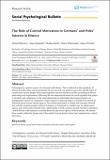Files in this item
The role of control motivation in Germans’ and Poles’ interest in history
Item metadata
| dc.contributor.author | Bilewicz, Michał | |
| dc.contributor.author | Stefaniak, Anna | |
| dc.contributor.author | Barth, Markus | |
| dc.contributor.author | Witkowska, Marta | |
| dc.contributor.author | Fritsche, Immo | |
| dc.date.accessioned | 2023-03-09T14:30:03Z | |
| dc.date.available | 2023-03-09T14:30:03Z | |
| dc.date.issued | 2019-08-16 | |
| dc.identifier | 283305921 | |
| dc.identifier | 7e49fd0b-9a3c-48ae-bfe1-29fe43ffcc9d | |
| dc.identifier | 85089041126 | |
| dc.identifier.citation | Bilewicz , M , Stefaniak , A , Barth , M , Witkowska , M & Fritsche , I 2019 , ' The role of control motivation in Germans’ and Poles’ interest in history ' , Social Psychological Bulletin , vol. 14 , no. 2 , e33399 , pp. 1-31 . https://doi.org/10.32872/spb.v14i2.33399 | en |
| dc.identifier.issn | 2569-653X | |
| dc.identifier.uri | https://hdl.handle.net/10023/27144 | |
| dc.description | Preparation of this article was supported by the Polish National Science Center (NCN) and Deutsche Forschungsgemeinschaft (DFG) BEETHOVEN Grant DEC-2014/15/G/HS6/04589. | en |
| dc.description.abstract | Contemporary societies seem to be obsessed with history. This is reflected in the popularity of historical books, films, and reenactments. In our research, we aimed to assess the specific types of content in which people are interested when exploring their national histories and the psychological factors motivating such explorations. Following the two-dimensional model of social cognition that points to morality and competence as main dimensions in person and group perception, we distinguished interest in competence-related aspects of national history (control) from interest in historical moral actions (moral agency). Two studies performed in Poland and Germany showed that in both countries people’s interest in history is structured in a similar way, in which moral agency and control play essential roles. Additionally, in both countries people reacted to individual control threats with enhanced curiosity about the past moral agency of their nations. We discuss these results within the framework of the model of group-based control and compensatory control processes. | |
| dc.format.extent | 31 | |
| dc.format.extent | 394423 | |
| dc.language.iso | eng | |
| dc.relation.ispartof | Social Psychological Bulletin | en |
| dc.subject | Interest in history | en |
| dc.subject | Group based control restoration | en |
| dc.subject | Personal control | en |
| dc.subject | Moral agents | en |
| dc.subject | BF Psychology | en |
| dc.subject | NDAS | en |
| dc.subject.lcc | BF | en |
| dc.title | The role of control motivation in Germans’ and Poles’ interest in history | en |
| dc.type | Journal article | en |
| dc.contributor.institution | University of St Andrews. School of Psychology and Neuroscience | en |
| dc.identifier.doi | https://doi.org/10.32872/spb.v14i2.33399 | |
| dc.description.status | Peer reviewed | en |
This item appears in the following Collection(s)
Items in the St Andrews Research Repository are protected by copyright, with all rights reserved, unless otherwise indicated.

